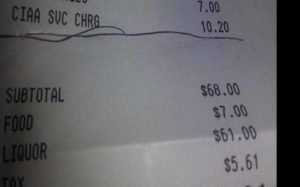
Visitors to the luxury hotel’s lobby and lounge during the tournament were astounded when they noticed a 15 percent “CIAA service charge” to all checks.
“We thought, ‘That’s interesting,’” said Patrice Wright to Charlotte’s WBTV. She said she and her husband who enjoyed sweet potato fries and two drinks each. When the bill came, it included a charge of $10.20 for “CIAA service charge” in addition to the price of the items and sales tax. “We have frequented the establishment several times and never had any surcharge that was associated with any organization that was in town.”
This “Black tax” is the kind of systemic racism that plagues the Black community across the country and shows up incrementally on occasions where African-Americans are gathered in large numbers. It is powered by the pervasive notion that Black people don’t tip—or tip in accepted percentages. So in comes the “CIAA service charge,” which supports the racist view at the expense of paying Black consumers.
The television station contacted the Ritz-Carlton about the strange “CIAA service charge.”
In an email to WBTV, the hotel said: “Due to the size of the CIAA event, we instituted a modest 15% service charge for our lobby beverage servers, on whom the event places significant demands throughout the weekend.”
Charlotte hosts the ACC Tournament, NASCAR events and other major conventions. Wright said she’s never incurred an extra service charge specific to those events. “Is there an ACC championship surcharge?” she asked. “Is there a Speed Street surcharge? Is there a Belk Bowl surcharge?”
The station asked the Ritz Carlton those questions. The Ritz Carlton did not respond.
“I was shocked,” Wright said. “I was disturbed because I thought that kind of price gouging had been addressed in previous years.”
Tom Murray, chief executive officer of the Charlotte Regional Visitors Authority, wanted no part of the controversy. “That’s not our decision,” he said to the Charlotte Observer. “Certainly it is their decision to defend whether they thought it was the right thing to do or not. I know it’s common practice in the industry for some restaurants to charge an automatic gratuity for large parties or special circumstances, and that’s what they may have done.”
Murray said private businesses have the option to alter prices if they choose. He said the CRVA was not aware of the CIAA service charge until the network brought it to its attention.
Murray tried to defend it, saying: “I think what it really. . . was an automatic gratuity. . . It certainly wasn’t a CIAA surcharge—that was misleading, and I think that was problematic.”
Patrice Wright said no Ritz employees told her or her husband about the CIAA service charge or automatic gratuity before or after the bill arrived.
“We left a gratuity in addition to the CIAA surcharge,” she said. “I’ve been to several different conventions and conferences, and we went to the Ritz and I’ve never seen that before. And if they had to do it, it should be blanket. It should not be identified by CIAA.”


